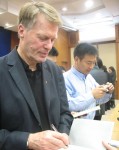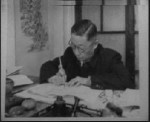 Le Clezio, Nobel Prize for Literature, is one of the few writers who has never disappointed me: by his work, his likings, his positions, his personality and his distrust of the small Parisian literary world !
Le Clezio, Nobel Prize for Literature, is one of the few writers who has never disappointed me: by his work, his likings, his positions, his personality and his distrust of the small Parisian literary world !
Le Clezio has always been interested in China (and Korea, where he teaches regularly). In 1967, at the opening of diplomatic relations, he asked to join the first group of Franco-Chinese cooperation, but unfortunately his application was rejected .
A long time interest in Chinese culture: “Reading the classics of Chinese literature, the discovery of Peking Opera, but also of traditional Chinese painting, had a deep influence. I especially like modern Chinese novels, including those of Lu Xun and Ba Jin and especially those of the Beijing novelist Lao She. I find that the depth, the enthusiasm and humor that emerge from this writer’s novels are of universal value “(1).
“A great admirer of Lao She”
Le Clezio explained recently in Beijing (2): “I am a great admirer of Lao She. For at least two reasons: the first is quite romantic. Like me, he is a member of an endangered tribe, the Manchus for him, Mauritians for me. I also liked his description of life in Beijing in the 30s (“Four generations under one roof”) (3) … it is a great novel about urban life … “
 A great novel to which Le Clezio devoted a remarkable preface. ” A novel about war and the Chinese resistance,” Four generations … ” is also a love story … but above all about the passion of Lao She for his hometown ….” “Today, the hutong (4), the main character in the novel by Lao She, is inexorably disappearing under the blows of bulldozers to the service, not of the Revolution, but of the commercial and planned modernization that is currently transforming one of the finest cities in the world into a desert of concrete and glass comparable to Shanghai and Hong Kong “(3).
A great novel to which Le Clezio devoted a remarkable preface. ” A novel about war and the Chinese resistance,” Four generations … ” is also a love story … but above all about the passion of Lao She for his hometown ….” “Today, the hutong (4), the main character in the novel by Lao She, is inexorably disappearing under the blows of bulldozers to the service, not of the Revolution, but of the commercial and planned modernization that is currently transforming one of the finest cities in the world into a desert of concrete and glass comparable to Shanghai and Hong Kong “(3).
Le Clezio travels regularly to China and in 2008, was awarded by the publisher People’s Literature, the prize of the best foreign writer for his novel “Ourania”. The writer is admired for the synthesis he was able to operate across many cultures, for his interest in those who live at the edges of the modern world and who worship nature and freedom.
Le Clezio’s interest and his thoughts on primitive societies are close to the approach of Gao Xingjian (Nobel Prize 2000) in “The Soul Mountain” (5): nature, woman, freedom, primitive societies, topics common to both writers. They are also close in their relationship with politics: Gao Xingjian distrusts all the “isms” and Le Clézio said: “I think that the time when the writers could play the role of a political spokesman is gone. Anyway, I do not feel capable to play this role. I feel more like a drum. I transmit the vibration. I’m not a drum which makes announcements but a drum which vibrates “(2).
At the end of 2009, Le Clezio presented in Beijing the Fu Lei prize, named after the great translator (1908-1966) of French literature, specially of Balzac and Romain Rolland, who was another victim of the Cultural Revolution (he hanged himself with his wife in 1966). This Fu Lei award was given to Zhang Zujian for a translation of Levi Strauss and to Ma Zhenchuang for his translation of “Essays” by Montaigne, the “French Confucius” as he rightly says …
For Le Clezio, “the human being is like a tree. When he is young and green, it is robust, flexible, dynamic and alive with a life force that allows revolt, indignation and violent cries … The tree over time, becomes increasingly dry and brittle … I hope that this will happen to me as late as possible “(2). Lao She might have answered: “we, the elder, we do not to ask forgiveness for what we are. We can only explain why we are so and encourage the young people to find their way into the future “(2).
Bertrand Mialaret
(1) quoted by Solange Cruveillé in http://jelct.blogspot.com (1/11/2008).
(2) “Connections” No. 52, November-December 2009.
(3) Mercure de France 1996, Volume 1.
(4) Traditional Beijing neighborhood of low gray brick houses built around a courtyard.
(5) “The Soul Mountain”, translated by Noel and Liliane Dutrait. Editions de l’Aube, 1995.





